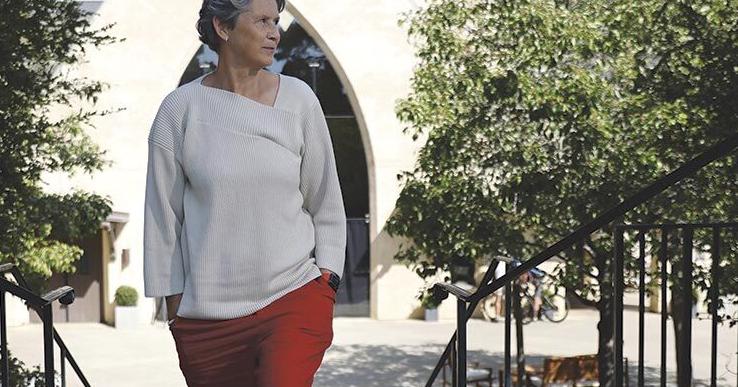
When Norwegian conductor Grete Pedersen walked out onto the stage for her first set at the Carmel Bach Festival in July 2022, her long strides, tall, upright posture and grateful-to-be-here countenance oozed with the type of confidence often reserved for professional athletes.
As it turns out, Pedersen was one of the top professional soccer players in her home country. She played her first match as midfielder for Norway when she was 19. By age 21, she decided to drop soccer in the name of her other love: music.
Pedersen’s Bach Festival performances earned roaring praise from the audience, musicians, staff, and, perhaps most importantly, the festival’s board of directors. In August, she was selected as the nonprofit festival’s new artistic director, following maestro Paul Goodwin’s 11-year reign.
With Pedersen, the Bach Festival gets a conductor with a command over, and respect for, the classics; however, she is also a true artist who thrives in a creative environment. Pedersen doesn’t shy away from making art her own, even if that means sometimes refreshing a masterpiece by adding a personal twist.
Her musical accolades are many. She studied at the Norwegian Academy of Music and Norwegian State Academy of Music in Oslo, and she founded the Oslo Chamber Choir in 1984.
Pedersen, whose jovial demeanor comes with a thick Norwegian accent, sat down with the Weekly during a recent trip to Carmel to talk about her vision for this annual local festival.
Weekly: Music over sports, why?
Pedersen: The most important thing is that music is not a competition about being the best. Music is something else. It’s about “how can we communicate with each other? How can we share this great music?”
An Irish harp player once told me he never writes his own stuff, but instead played to “simply carry on the rich tradition of the instrument.” As a conductor, do you similarly view your role as a vehicle to continue the classical music tradition?
I really want to learn from the tradition, I want to be part of it, but it’s also not possible for me to not create something new along the way.
Do you ever add your own touch to existing pieces?
I want to respect the composer, but from time to time I do do things like that – play with it a little bit. I think creation is part of the art form. No two performances are ever the same for me, and musicians respond differently to that. Most will feel very engaged and excited, others will think it’s a little bit dangerous. I like to be on the risky side.
In the relationship between the musicians and the audience, how do you describe the role of the conductor?
It’s my role to make the music get out of the musicians and reach the audience. It’s always the musicians who are making the vibrations in the room, but we also feel the audience and when they react, it also influences me. It’s very much alive. I know I can create things and influence the atmosphere of the hall, but it’s never me who is making the sounds.
A big band musician told me that once you count a song off, there is no stopping. It’s a wave you can only ride, not control. While conducting a performance, do you feel you’re in the driver’s seat or that you are riding along?
[Laughs] It’s like being on a big boat. I’m in the captain’s seat with a steering wheel but I’m seated in the back. I have the entire boat in view, and a lot of things are happening in front of me, but it’s controlled from the back, rather than in front with the boat behind me.
We hear again and again that the audience for classical music is shrinking. Do you feel an existential urgency to bring classical music to new audiences or do you feel like it eventually finds its way into enough hearts to sustain itself?
I think it will sustain. The main thing is to get people to listen to the music, whether they are 10 or 90 years old. For me, this music feels so important and I want to share it.
In Carmel, it’s a lot of people with a lot of resources, but we all feel the same emotions, and we need the same things for life to be fulfilling. I don’t think music will save the world, but it can for sure make life much richer.